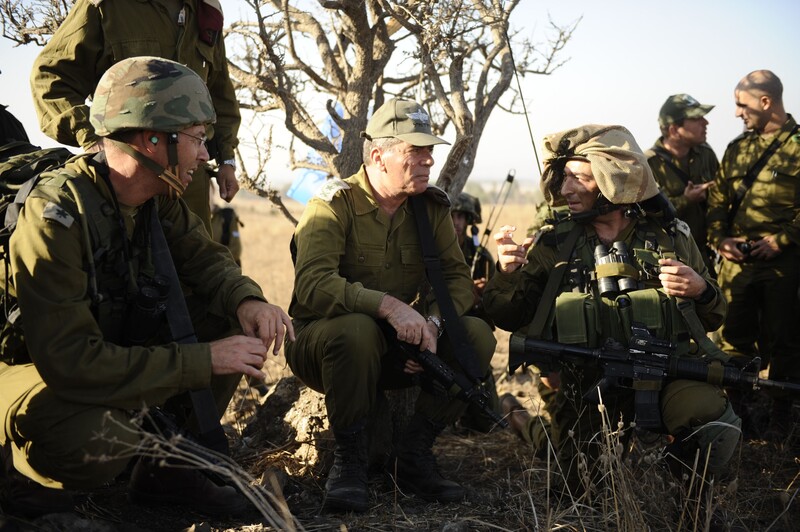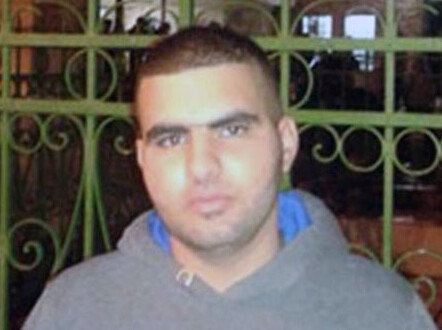Rights and Accountability 12 April 2016

Colonel Yisrael Shomer, right, speaks to then Israeli army chief of staff Gabi Ashkenazi, center, during a 2010 military exercise. (Israel Defense Forces)
The Israeli army has closed its investigation into the colonel who shot a 17-year-old Palestinian boy to death while he was fleeing.
Last July, Yisrael Shomer, a commander of the Binyamin Brigade, shot Muhammad al-Kasbeh with live ammunition.
Muhammad had allegedly thrown a rock at Shomer’s jeep near the military checkpoint at Qalandiya in the occupied West Bank.
The shooting took place in the early morning after Muhammad and his friends had tried to cross Qalandiya, which separates East Jerusalem from the remainder of the West Bank.
They had hoped to attend prayers at al-Aqsa mosque in Jerusalem during Ramadan.

Muhammad al-Kasbeh
Defense for Children International PalestineThe Israeli human rights group B’Tselem described the closure of the case as “an integral part of the whitewash mechanism which is Israel’s military investigative system.”
Sharon Afek, Israel’s military advocate-general, found that the shooting was justified, as Shomer had shot Muhammad while conducting an arrest. The open-fire regulations for the Israeli military permit soldiers to shoot suspects in the legs in order to detain them.
Muhammad was hit by three bullets: one in the face and two in the back. There were no gunshot injuries to his legs.
The investigation determined that Shomer’s shots were inaccurate because Muhammad was in motion, according to the Tel Aviv newspaper Haaretz.
Disregard for life
Afek said it was “a professional mistake in the way he [Shomer] fired, but one that was made in clearly operational circumstances.”
Security camera footage from a nearby gas station first obtained and released by B’Tselem supported the human rights organization’s claims that the soldiers were in no imminent danger.
The footage shows the rapid series of events.
A person, presumably Muhammad, runs up to the army vehicle and throws a rock at the windshield. Muhammad immediately turns and runs out of view of the camera, while two soldiers exit the jeep and immediately begin firing in his direction.
The footage refutes claims made by Roni Numa, a major-general in the Israeli military’s central command, that Shomer was “faced with real mortal threat.”Human rights organizations argued that Shomer shot to kill.
“The multiple gunshots that struck the teen in the face and upper part of his body at close distance suggest the military commander had fired to kill rather than subdue him,” Ayed Abu Eqtaish, a representative of Defense for Children International-Palestine, said.
“Such unnecessary excessive force, including the use of live ammunition, in response to stone-throwing youth shows a complete disregard for human life,” Abu Eqtaish added.
Muhammad, a resident of Qalandiya refugee camp, was the third boy in his family to be shot to death by Israeli soldiers.
His brothers Yasser and Samer, then aged 10 and 15, were both killed in 2002.
Permission to shoot
At the time of the incident, Shomer received widespread support from the military and political establishment, including from several ministers.
B’Tselem argued that such support rendered “open-fire regulations that supposedly govern the use of lethal force in the West Bank utterly superfluous.”
Last September, as part of a broad crackdown on Palestinian protesters and stone-throwers, Israel’s cabinet weakened the already lax open-fire regulations by permitting forces to use live ammunition when they believe anyone’s life may be in danger.
“From now on, they will be allowed to open fire – and they will know they have a right to do so – when anyone’s life is in danger,” Benjamin Netanyahu, Israel’s prime minister, said.
Another Israeli human rights group, Yesh Din, has found that only 1.4 percent of complaints submitted to the Israeli military police criminal investigations division between 2010 and 2013 resulted in an indictment.





